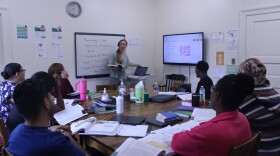After over two years of pandemic-era schooling, labor shortages and political battles over schools, some New Hampshire districts say they’re facing an unprecedented number of open positions for the 2022-2023 school year.
The Nashua School District has close to 500 positions open, when it typically has only several hundred each spring. Many of these are for after-school programs and paraprofessionals, but Superintendent Garth McKinney says they run the gamut.
“We’re hiring from paras to plumbers,” he wrote in a press release. “Our needs are real.” Nashua is offering signing bonuses to nearly all new hires.
The state’s largest school district, Manchester, is also offering signing bonuses to paraprofessionals, the position with the greatest shortage. Like most districts, Manchester long has struggled to hire enough of them to work with students with special education needs. Though paraprofessionals in Manchester often receive health benefits, pay is $15 per hour or less.
Paula Jones, the principal of Henry Wilson Elementary School, said she has been operating this year with three paraprofessionals. But the school qualifies for 10.
“We have staff that are willing to dig in and lend a helping hand and do what needs to be done,” she said. “But it's to the point where it's exhausting.”
Starting this spring, Manchester is offering $1,000 signing bonuses to paraprofessionals, and an additional $500 if they stay for a certain length of time. The district is holding an in-person job fair on May 7.
In many districts, the signing bonuses and number of open positions aren’t just a reflection of New Hampshire’s workforce shortage; they’re the result of unprecedented funding from the federal government. Since the pandemic began, New Hampshire schools have received millions in federal COVID relief aid that allows districts to hire more staff. Many of these funds are supposed to help mitigate learning loss, and could help pay for social workers, after-school programs, special education teachers and paraprofessionals.
“There's this weird phenomenon where we, for the first time probably ever, have this excess of funds for the next three years,” Paula Jones said. “And we can't find the people to fill the positions.”
For the last several years, the New Hampshire Department of Education has noted a “critical shortage” in the state for teachers of nearly every subject. This designation helps teachers who fill those roles to participate in federal student loan forgiveness programs and get a teaching license more quickly.
And some said upcoming departures this spring could make that critical shortage even more dire.
Jennifer Given, a social studies teacher at Hollis Brookline High School and president of the local teachers’ union, says some of her colleagues are leaving because of the accumulated frustrations of pandemic-era schooling and the possibility of higher pay in a lower-stress job.
But she says political pressure has also dampened morale. Some parents and conservative lawmakers are accusing teachers, sometimes directly, of indoctrinating students on issues of race and gender and of being “unhinged,” “Marxist,” and “un-American.”
“It’s hard to understate the cumulative effect of abuse, and I don’t use that word lightly,” she said. “Then you go home and you're spending hours of your personal time grading, or spending your own money on things that your classroom needs. And you're just thinking to yourself: ‘What am I doing this for, just to have it spit back in my face?’
When it comes to teacher retirements, the NEA-NH, the state’s largest teachers’ union, said it is too early to know how many are leaving at the end of this year. But so far, they said interest in teacher retirement workshops has been higher than usual.








